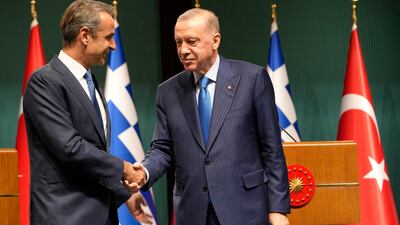Grim as they may be, disasters have a knack for bringing people together.
In the summer of 1999, Turkey and Greece both suffered major earthquakes: a 6.0-magnitude temblor in Izmit killed about 18,000 people three weeks before a huge 7.6 quake shook Athens, killing nearly 150 and doing $4 billion in damage.
Yet each rushed aid to the other, thawing icy relations between the oft-feuding neighbours. This “earthquake diplomacy” led to deals on reduced military spending, illegal migration and border security and ushered in an extended period of friendliness. It helped that the European Council granted Turkey applicant status to be an EU member in late 1999.
Now, a quarter century later, we have seen a similar shift in the wake of the devastating February 2023 earthquake in south-east Turkey, which killed more than 50,000 people. The rivals teetered on the brink of war in August 2020 after a Greek warship approached the Turkish coast, and two years later a top Turkey analyst saw a Turkey-Greece conflict as “probable”.
But Turkish President Recep Tayyip Erdogan and Greek Prime Minister Kyriakos Mitsotakis both won re-election in spring 2023, boosting their confidence and political goodwill. Then, at an Athens summit last December, the two leaders signed a series of deals and Mr Erdogan talked of turning the Aegean “into a sea of peace”.
That dream may be nearing fruition. As tourist season dawns, a Turkish friend has been sharing photos on social media from a Turkish-organised cruise of Greek islands, and she’s far from alone: the Aegean islands of Lesbos, Chios, Samos, Kos and Rhodes welcomed nearly 21,000 Turkish tourists in early April, nearly quadruple last year’s total.
The surge is mainly due to a new visa-on-arrival scheme for Turkish visitors to 10 of Greece’s Aegean islands. Before, they would have needed a Schengen visa, just as they would need for Paris or Rome. Acquiring the EU-wide visa had become a rarity for Turks in the past few years as Schengen refusal rates for Turkish nationals increased sharply.
Put in place by Mr Erdogan and Mr Mitsotakis in Athens last year, the new visa scheme has pointed the Aegean towards a prosperous summer. Turkey’s Mediterranean resort towns may have lost some domestic visitors due to Greece’s lower prices, but Istanbul is again welcoming record tourist arrivals this year, so it could all balance out.
“Our basic approach to diplomacy is the win-win principle,” Turkey’s leader told the Greek newspaper Kathimerini on the weekend. “The goal is simple: to consolidate our friendship and raise the level of our bilateral relations to a level unprecedented in history.”
Turkish-Greek relations may be at their strongest in nearly a decade, yet such sunny talk can come across as a bit jarring. Moving past the open discord of the past, the frequent foes seem to have found a way to compartmentalise, if this week’s summit in Ankara is any indication.
“We showed today that alongside our proven disagreements, we can chart a parallel page of agreements,” Mr Mitsotakis said at a joint news conference on Monday.
Indeed, the progress has been significant, but limited. The major sticking points – Aegean islands militarisation and maritime delimitation, Cyprus and Eastern Mediterranean energy rights – remain and could flare up any time.
It helps that Athens is in a better place. After a dozen years in crisis, the Greek economy has finally recovered, growing at about twice the eurozone average in 2023. With Europe’s parliamentary elections looming, Mr Mitsotakis appeared to tread lightly in Turkey, mainly looking to extend the positive climate.
One potential looming fissure is the governing Justice and Development Party’s (AKP) apparent rightward shift in an effort to recapture some of the votes recently lost to the Islamist New Welfare Party. Even setting aside Turkey’s trade embargo on Israel, there are a handful of examples.
For example, last week saw the celebrated opening of Istanbul’s Kariye Mosque.
Like nearby Hagia Sophia, it was originally built more than a millennia ago as a Byzantine church before being converted into a mosque by the Ottomans, then into a museum in the mid-20th century. Mr Mitsotakis said the latest conversion was unnecessary and “offends the rich history of Istanbul”, adding that he would discuss the issue with Mr Erdogan.
As summer approaches, progressive Turks are bemoaning the disappearance of social and cultural events. A top Turkish journalist last week highlighted the absence this year of stadium concerts and music festivals such as Rock ‘n Coke, Efes Blues and Noizine. These days Istanbul is more likely to host events such as the Natural Life Festival, focused on organic farming and healthy living.
When summer ends, Turkish students will dig into a new curriculum that appears to have five compulsory religious courses, up from the previous one. The new curriculum also adds instruction on Ankara’s Blue Homeland doctrine, which asserts Turkish control over much of the Black Sea, Eastern Mediterranean and Aegean.
That neo-Ottoman vision, unsurprisingly, tends to spur Greek ire, and with these neighbouring rivals, the question is not whether someone will upset the apple cart, but when. Somehow, the friendlier vibes of earthquake diplomacy lingered until 2011, when Turkish officials began challenging Cyprus’ economic zone claims and arguing that Greece’s eastern islands had no continental shelf.
Comparatively speaking, that’s an eternity of cosiness for these two. Today, neither side is suggesting talks on the big issues, which underscores the gap between them. All may be calm on the surface, but as long as a major breakthrough remains beyond the horizon, a stray comment or misstep has the potential to shake this sweet amity in the Aegean.


